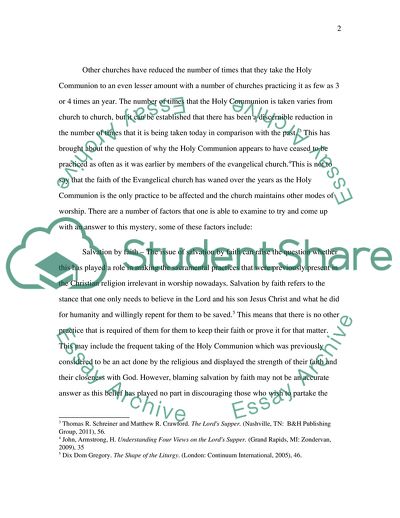Cite this document
(Why has the Sacramental Practice of Holy Communion Stopped for the Evangelicals Essay Example | Topics and Well Written Essays - 2000 words - 2, n.d.)
Why has the Sacramental Practice of Holy Communion Stopped for the Evangelicals Essay Example | Topics and Well Written Essays - 2000 words - 2. https://studentshare.org/religion-and-theology/1795958-why-has-the-sacramental-practice-of-holy-communion-stop-for-the-evangelicals
Why has the Sacramental Practice of Holy Communion Stopped for the Evangelicals Essay Example | Topics and Well Written Essays - 2000 words - 2. https://studentshare.org/religion-and-theology/1795958-why-has-the-sacramental-practice-of-holy-communion-stop-for-the-evangelicals
(Why Has the Sacramental Practice of Holy Communion Stopped for the Evangelicals Essay Example | Topics and Well Written Essays - 2000 Words - 2)
Why Has the Sacramental Practice of Holy Communion Stopped for the Evangelicals Essay Example | Topics and Well Written Essays - 2000 Words - 2. https://studentshare.org/religion-and-theology/1795958-why-has-the-sacramental-practice-of-holy-communion-stop-for-the-evangelicals.
Why Has the Sacramental Practice of Holy Communion Stopped for the Evangelicals Essay Example | Topics and Well Written Essays - 2000 Words - 2. https://studentshare.org/religion-and-theology/1795958-why-has-the-sacramental-practice-of-holy-communion-stop-for-the-evangelicals.
“Why Has the Sacramental Practice of Holy Communion Stopped for the Evangelicals Essay Example | Topics and Well Written Essays - 2000 Words - 2”. https://studentshare.org/religion-and-theology/1795958-why-has-the-sacramental-practice-of-holy-communion-stop-for-the-evangelicals.


